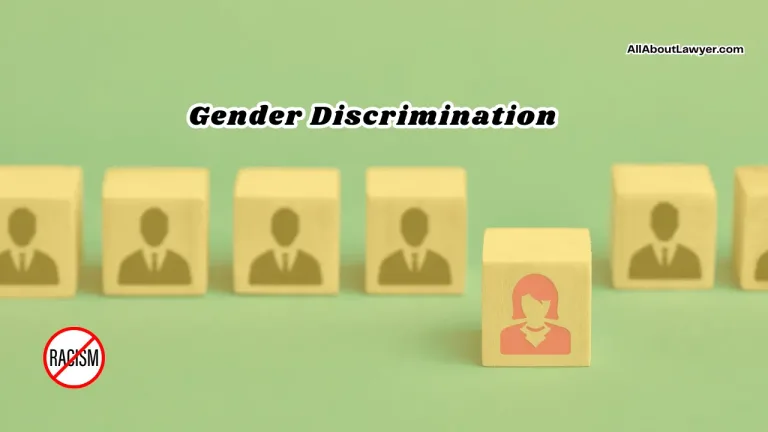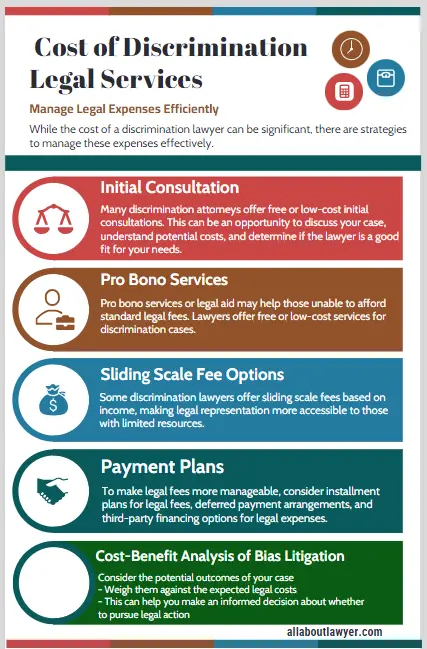How Much Does a Discrimination Lawyer Cost?
When facing discrimination, whether in the workplace, housing, or education, many individuals consider looking for legal representation. However, a common concern is the cost associated with hiring a discrimination attorney. This article guide will explore how much does a discrimination lawyer cost and various factors that influence the fees of bias lawsuit experts and provide insights into what you can expect when seeking equal rights legal counsel.
Table of Contents
Understanding Discrimination Attorney Fees
The cost of hiring a discrimination lawyer can vary significantly based on several factors. It’s essential to understand these variables to make an informed decision when seeking legal representation for your bias case.
Factors Influencing Discrimination Lawyer Costs
1. Types of Discrimination Cases
The nature of your discrimination case can impact the cost of legal representation. Different types of discrimination may require varying levels of expertise and resources:
– Racial bias counsel may have different fee structures compared to gender discrimination advocates.
– Age prejudice litigators might charge differently than disability discrimination specialists.
– Housing bias experts may have different rates than workplace discrimination specialists.
2. Attorney Experience and Reputation
The experience and reputation of the discrimination attorney can significantly influence their fees:
– Seasoned bias lawsuit experts with a track record of successful cases often command higher rates.
– Newly established prejudice representation services might offer more competitive pricing to build their clientele.
3. Geographic Location
The cost of legal services can vary based on location:
– Urban discrimination lawyer prices tend to be higher than rural bias attorney fees.
– Regional prejudice counsel costs may differ based on the local cost of living and legal market dynamics.
4. Case Complexity
The intricacy of your discrimination case plays a crucial role in determining legal costs:
– Straightforward bias cases might incur lower fees.

– Complex discrimination suits involving multiple parties or extensive evidence may lead to higher legal expenses.
Common Fee Structures for Discrimination Lawyers
Discrimination attorneys typically use one of several fee structures. Understanding these can help you better manage your expectations and budget for legal services.
1. Hourly Rates for Bias Cases
Many discrimination lawyers charge by the hour. Hourly rates can range from $150 to $500 or more, depending on the attorney’s experience and location. When working on an hourly basis, lawyers track their time spent on:
– Case research and analysis
– Document preparation
– Client communications
– Court appearances
2. Contingency Fees in Discrimination Suits
Some discrimination attorneys work on a contingency basis, particularly in cases with potential monetary awards. Under this arrangement:
– The lawyer only gets paid if you win your case or reach a settlement.
– Fees are typically a percentage of the recovery amount, often ranging from 30% to 40%.
– This structure can make legal representation more accessible for individuals who cannot afford upfront costs.
3. Flat-Rate Prejudice Representation
For certain services, discrimination lawyers may offer flat-rate fees:
– Initial consultations
– Document review
– Specific legal tasks related to your case
This pricing model can provide clarity and predictability for clients.
Additional Costs to Consider
Beyond the lawyer’s fees, there are often additional expenses associated with discrimination cases:
– Court filing costs for discrimination lawsuits
– Expert witness fees in bias cases
– Document preparation charges
– Deposition expenses
– Travel costs (if applicable)
– Photocopying and postage fees
It’s important to discuss these potential additional costs with your lawyer upfront and understand how they will be billed.
Understanding the Cost of Discrimination Legal Services
While the cost of a discrimination lawyer can be significant, there are strategies to manage these expenses effectively.
1. Initial Consultation Charges
Many discrimination attorneys offer free or low-cost initial consultations. This can be an opportunity to:
– Discuss your case
– Understand potential costs
– Determine if the lawyer is a good fit for your needs
2. Pro Bono Discrimination Services and Legal Aid
For those who cannot afford standard legal fees, pro bono services or legal aid options may be available:
– Many lawyers dedicate a portion of their time to pro bono work.
– Legal aid organizations often provide free or low-cost services to qualifying individuals facing discrimination.

3. Sliding Scale Fee Options
Some discrimination lawyers offer sliding scale fees based on the client’s income:
– This can make legal representation more accessible to individuals with limited financial resources.
– Discuss this possibility with potential attorneys during your initial consultation.
4. Payment Plans and Financing Options
To make legal fees more manageable, consider:
– Installment plans for legal fees
– Deferred payment arrangements
– Third-party financing options for legal expenses
5. Cost-Benefit Analysis of Bias Litigation
Before proceeding with legal action, conduct a cost-benefit analysis:
– Consider the potential outcomes of your case
– Weigh them against the expected legal costs
– This can help you make an informed decision about whether to pursue legal action
Understanding the Value of Legal Representation in Discrimination Cases
While the cost of a discrimination lawyer is an important consideration, it’s also crucial to understand the value they provide:
– Expertise in navigating complex discrimination laws
– Ability to negotiate settlements effectively
– Skilled representation in court proceedings
– Knowledge of precedents and legal strategies specific to bias cases
When considering the long-term benefits of legal representation, the cost may be a worthwhile investment in protecting your rights and seeking justice.
Comparing Costs: Big Law vs. Boutique Practices
The size and type of law firm can significantly impact costs for discrimination cases:
Big Law Firms:
– Often have higher hourly rates (can exceed $500 per hour)
– May have more resources for complex cases
– Typically handle high-profile or class-action discrimination suits
Boutique Prejudice Practices:
– Generally offer more competitive rates (often $200-$400 per hour)
– May provide more personalized service
– Often specialize in specific types of discrimination cases
Solo Bias Attorneys:
– May have the most flexible rates (can start as low as $150 per hour)
– Often provide direct, one-on-one attention to clients
– May be more willing to negotiate fee arrangements
Cost Variations by Type of Discrimination Case
Different types of discrimination cases can have varying costs:
1. Workplace Discrimination
Employment discrimination cases can be complex and time-consuming, often resulting in higher legal fees. These may be more likely to work on a contingency fee basis.
2. Housing Discrimination
Housing bias cases may have lower overall costs due to potentially shorter case durations but can still involve significant expenses for evidence gathering and expert testimonies.
3. Education Discrimination
Cases involving educational institutions may have unique cost considerations, particularly if they involve federal funding or complex institutional policies.
4. Public Accommodation Discrimination
These cases might have lower costs compared to employment cases but can still involve significant legal work, especially if seeking policy changes.
The Impact of Case Duration on Costs
The length of your discrimination case can significantly impact the overall cost. Factors that can extend case duration include:
– Complexity of legal issues
– Amount of evidence to be gathered and reviewed
– Willingness of parties to negotiate or settle
– Court backlogs and scheduling
Longer cases generally result in higher legal fees, especially when working with an attorney charging hourly rates.
Strategies for Managing Legal Costs in Discrimination Cases
To keep your legal costs under control, consider these strategies:
1. Be Organized
Provide your lawyer with all relevant documents and information in an organized manner. This can reduce the time they need to spend sorting through your case.
2. Communicate Efficiently
While it’s important to keep your lawyer informed, try to consolidate your communications. Instead of frequent short calls, schedule longer, more comprehensive discussions.
3. Understand Billing Practices
Know what you’re being charged for. Some lawyers charge for every phone call or email, while others may have different practices.
4. Consider Alternative Dispute Resolution
Mediation or arbitration can often be less expensive than going to trial. Discuss these options with your lawyer.
5. Be Realistic About Your Case
Listen to your lawyer’s assessment of your case. Pursuing a weak case can be costly and unproductive.
Conclusion
The cost of hiring a discrimination lawyer can vary widely based on numerous factors, including the type of discrimination, the lawyer’s experience, location, and the complexity of your case. While legal representation can be expensive, it’s often a necessary investment to protect your rights and seek justice in cases of bias and prejudice.
When seeking a discrimination attorney, it’s crucial to discuss fees upfront, understand all potential costs, and consider the value that expert legal representation can provide. By being informed and proactive, you can make the best decision for your specific situation and budget.
Remember, while cost is an important factor, it shouldn’t be the only consideration when choosing a discrimination lawyer. The right attorney can make a significant difference in the outcome of your case, potentially providing value that far exceeds their fees.
Related Articles For You:
Housing Discrimination Attorney In Los Angeles
FAQs
1. What is the average hourly rate for a discrimination lawyer?
The average hourly rate for a discrimination lawyer can range from $200 to $400, but rates can be lower or higher depending on location, experience, and firm size.
2. Do discrimination lawyers offer free consultations?
Many discrimination lawyers offer free initial consultations, but this varies by attorney. Some may charge a nominal fee for the first meeting.
3. Can I get a discrimination lawyer on a contingency fee basis?
Yes, some discrimination lawyers work on contingency for certain types of cases, particularly those involving potential monetary awards like workplace discrimination suits.
4. How much does it cost to sue for discrimination?
The cost to sue for discrimination can vary widely, from a few thousand dollars for simple cases to tens or hundreds of thousands for complex litigation. Factors include case complexity, duration, and whether it goes to trial.
5. Are there any low-cost alternatives to hiring a discrimination lawyer?
Yes, alternatives include legal aid societies, pro bono services, law school clinics, and government agencies like the Equal Employment Opportunity Commission (EEOC).
Visit All About Lawyer For more Articles.
About the Author

Sarah Klein, JD, is a former employment attorney who has advised clients on wrongful termination, workplace discrimination, wage disputes, and employee rights. At All About Lawyer, she writes practical, legally sound guides to help workers understand labor laws and stand up for fair treatment at work.
Read more about Sarah
